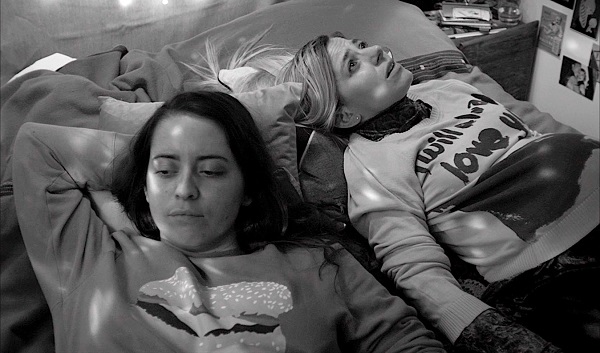
Gonzalo Maga’s This is Cristina is a misleading title. I mean yes, it does focus a lot on its thirtysomething titular character (Mariana Derderián). However, it also pays some attention to her best friend Susanna (Paloma Salas). They’re in their late thirties, they’re their own version of women-children. But in fairness to them, the men around them are worse. Susanna tells her boyfriend Marcelo (Bernardo Quesney) to leave her mother’s going away party. And his bad attempt at clapping back has him saying “Negative vibes always bounce back”. His words are ominous though, as Cristina is awkwardly dealing with her own divorce. Those breakups are going to tear their friendship apart and lead them into the arms of other men.
The literature around Maga’s movie gave the impression of how it might spend its 82 minute running time. Its synopsis hinted at a movie showing two women-children flail about. But it at least constructs its little web of characters to make its structure more interesting. Instead of making a mess at parties, Cristina watches avantgarde dance pieces and runs into his creative writing professor, Romulo. Susanna, on the other hand, gets a visit from her father. And he asks her for a favour that only a daughter can say yes to.
Maga previously worked with fellow Chilean director Sebastian Lelio, who is upfront about the country’s past and contemporary prejudices. The movie lists Lelio as a cast member although I have no idea when he pops up. Anyway, Maga’s movie more contemporary and micro and unfortunately, there’s a hint of sadism here that critics accuse Lelio of. This Is Cristina‘s sadism comes to the forefront as it eventually makes its insufferable characters collide. Romulo is the kind of character who’s really worthy of just one scene. He’s the kind of character who throws tantrums in public. I’m happy that none of my professors pulled the kind of stunts he pulls. That’s because those stunts would make me want to drop out of his classes. Instead, Cristina starts a relationship with him.
The same goes with Susanna’s father asking her to be a co-signer for a loan. She says yes to this even if it’s an obvious red flag. It’s as if the movie slapped its characters together just to create conflict. It does this instead of sharpening its focus on its two leads. Silver lining includes Derderian’s piercing, angry gaze. But she deserves a director who can do South American thirtysomething ennui better than this. And I’ve seen better South American thirtysomething female ennui, so I’d know. I should be fair, since some of the details here feel more autobiographical. It’s as if some of its archetypal minor characters are bad because their real life equivalents are worse.
There are also b-plots here that have a different emotional goal but have the same feel. For example, there’s a plot point about Cristina and Susanna’s dead friend. The movie depicts its drama through black and white to emphasize its thirtysomething ennui. But that’s a trope that feels 2012 more than it does 2021. The same goes for its piano heavy score playing when its characters are together. Characters finding each other and wanting to stick to each other arbitrarily. Cristina credits Salma Hayek as an executive producer and although it’s nice of billionaire’s wives to give money away, the end result doesn’t display her help. And that ending feels sudden and unearned.
This is Cristina comes to OVID tomorrow.


